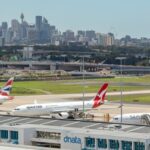Guest Contributor
Contributors are not employed, compensated or governed by TD, opinions and statements are from the contributor directly

Sydney Airport is bracing for a significant overhaul. However, the question remains: will airlines embrace the changes, or will they lead to more delays and cancellations?
Last year, Federal Transport Minister Catherine King was criticised for seemingly favouring Qantas when it advised her against allowing rival Qatar Airways to increase flights to Australia significantly. Qatar Airways argued that the additional capacity would lower long-haul airfares, while Qantas contended that such a move would cost Australian jobs.
In a world where Australians count every penny on groceries but are still willing to pay whatever it costs to travel, siding with the national carrier may have seemed like the right political move for Minister King.
Fast forward to this week, and Minister King’s pledge to rewrite Sydney Airport’s operational manual is set to ruffle feathers. The reform package aims to improve efficiency at Australia’s largest gateway, enhance competition, and ensure more reliable service for travellers.
The government’s proposed reforms squarely target cancellation rates. A recent report commissioned by the Australian Travel Industry Association (ATIA) and compiled by former Qantas Economist Tony Webber found that airlines were cancelling flights to maximise profits. Cancellation rates at Sydney Airport have risen from just 0.8% in 2003 to an alarming 5.3% in 2023.
The report revealed that airlines were strategically consolidating travellers onto fewer flights, thereby tightening capacity and removing seats from sale. This subsequently pushed prices and profits up for those yet to book.
Minister King is now promising to regularly publish data on how airport take-off and landing slots are utilised. However, despite consistent calls by ATIA for the 80/20 rule to be tightened to 95/5, the Minister has so far neglected to address this.
Instead, the government plans to tighten the peak-hour windows, opening key slots between 6-7 am and 3-5 pm for airlines serving regional NSW to operate during these hours.
This will be welcome news to Rex and perhaps to ultra-low-cost carrier Bonza. The emerging carrier has stated that it could operate as many as 20 routes from Sydney Airport if given access, with 80% of these markets currently having no low-cost option.
Qantas may be the dominant player in this argument and will ensure its voice is heard, but Minister King will be keen not to appear subservient to the Flying Kangaroo and avoid another ‘Qatar-Gate’ public trial. Expect the Prime Minister to get involved at some point.
The post Sydney Airport Reforms: A Turbulence or Smooth Landing for Travellers first appeared on Stray Nomad Travel News.
